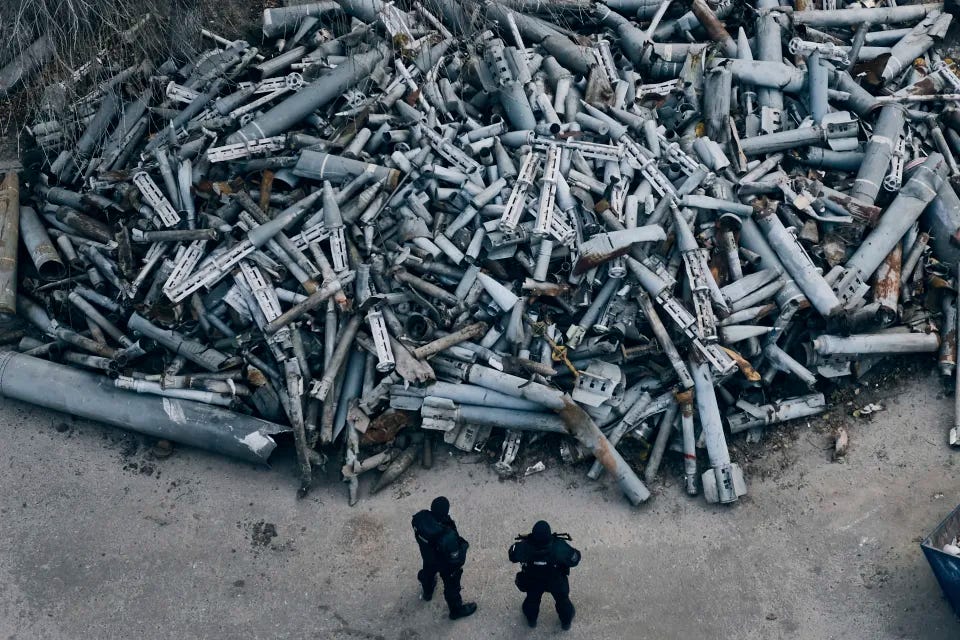Clearing Russian Debris
Supporting the dangerous work of demining Ukraine
This month marked the 25th anniversary of the OTTAWA CONVENTION, the Anti-personnel Mine Ban Treaty signed by 133 states across the world, including Ukraine - but notably not by Russia. This anniversary is important for Ukraine & countries supporting Ukraine in demining efforts to clear Ukrainian territory of the obscene numbers of mines Russians have laid in contravention of international law. The occasion and the existence of this treaty is also one of many glaring examples of 30 years of Russia thumbing its nose at international norms and democratic values - a continuation of an imperialist mindset that disregards human dignity & life.
UKRAINE LITTERED WITH EXPLOSIVES: Adding to the unexploded ordnance resulting from ten months of Russian bombardment of Ukraine, retreating Russians also routinely lay banned deadly mines that kill and maim civilians. Under international law, anti-vehicle mines are not prohibited - but explosive devices and bombs designed to kill or maim individuals who stumble across them are illegal.
Ukrainian State Emergency Services and Ministry of Defence engineers do their best to tackle the masses of deadly mines laid by retreating Russians & other unexploded bombs & ordnance that covers 30% of Ukraine. Even before the full-scale invasion, mines laid in the east brought Ukraine to fifth in the world for civilian casualties caused by mines and third for anti-vehicle mine incidents. In addition to the ongoing “strategic bombing” campaigns against cities and critical infrastructure, 14.5 million people are still at risk of being injured or killed by unexploded ordnance.
It will take decades to clear these mines and bombs - and it will take thousands of local experts, demining teams and international partners to do the job.
This autumn, Mriya Aid provided $50,500 to send 22 Ukrainians for international standards TRAINING FOR SAFE DEMINING & DISPOSAL :
12 non-commissioned officers (NCO) of the Armed Forces of Ukraine: travel & training costs for International Mine Action Standards (IMAS) Ex plosive Ordnance Disposal Levels 1 & 2 courses .
10 Ukrainian personnel: 4-week IMAS EOD L3 course to become trainers - a course open to those who had previously attended FoU-EOD IMAS EOD L2.
In partnership with Friends of Ukraine EOD, who describe the impact of this training thus: “In December alone, 22 Ukrainians from INGO's, NGU, SSTS, NPU and others will graduate as IMAS EOD operators - a fantastic achievement”.
Mriya Aid also sent EOD equipment to Ukraine earlier this year.
Demining and explosive ordnance disposal is crucial for many reasons:
To save lives & to make communities safe
To restore economic activity by allowing farmers to plant and harvest crops
To enable social recovery - to bolster civilian confidence and to allow refugees to return home safely
Demining is one of Mriya Aid’s long term aid commitments to Ukraine. Help us rebuild Ukraine by making it safe again.
There are many points of impact in this area of aid:
Training sappers & emergency professionals
Sponsoring Ukrainian personnel by covering travel & course costs
Maintaining databases & apps to identify and map mined areas
Supporting information campaigns that support civilians & help deminers
Working in partnership with governments and NGOs supporting demining
Insight:
Sappers, or combat engineers, are soldiers responsible for clearing mines. “Sappe”, a French word for “spadework” or “trench”, has been used in the military context since the 17th century. In Ukrainian and other languages (ex. Latin) “sapa” is a hoe, an agricultural tool used for digging and grubbing.
Ukrainian sappers and civilian minesweepers work in teams to demine liberated territories of Ukraine and clear them of other explosive remnants of war. It is painstaking work. Different mines and types of terrain impact the pace and progress of demining operations. For instance, a long day’s manual work in a forest results in clearing 8-16 sq m.
It is also dangerous work: for every 5,000 successfully removed land mines, one demining specialist is killed and two are injured. On Dec 7, a Ukrainian police team hit a mine trap that claimed the lives of four officers. Police Colonel Mykhailo Kuratchenko was named Hero of Ukraine, while medals For Courage were awarded to police captains Ihor Melnyk & Serhiy Nenada and police corporal Vadim Perizhko.
While sheltering in a basement, Ukrainian teen Igor Klymenko designed a drone that detects unexploded landmines and sends the coordinates remotely to the operator. After developing two working prototypes with engineers, Klymenko was awarded the Chegg.org Global Student Prize, a $100,000 award for a student making an impact.
Drones, armoured tractors & excavators, and mine-sniffing dogs like Patron, the Jack Russel Terrier who works with Ukrainian State Emergency Service deminers, all contribute to rendering Ukraine safe for civilians and for the great work that lies ahead in rebuilding the country and in healing the trauma of crushed lives and the pains and voids created by Moscow’s arrogant imperialist stance and obsessive destruction of all things Ukrainian.
Your support of Mriya Aid and your feedback and comments on Twitter and Instagram are greatly appreciated.
See the newest from Mriya Aid @ twitter.com/MriyaAid
Listen to news from Ukraine, interviews and analysis 24/7 & ask your questions about Ukraine to our friends, the guests & moderators @mriyareport
The image of the police officers looking at collected fragments of the Russian rockets that hit Kharkiv was described as "insane" by retired US Army Major John Spencer (AP Photo/Libkos) https://uk.news.yahoo.com/insane-photo-shows-huge-pile-of-used-russian-rockets-in-ukraine
A group of Ukrainian women attend a lecture given in a classroom at the MAT Kosovo compaound in Peja. https://www.vice.com/en/article/4axa7n/ukraine-women-explosives






